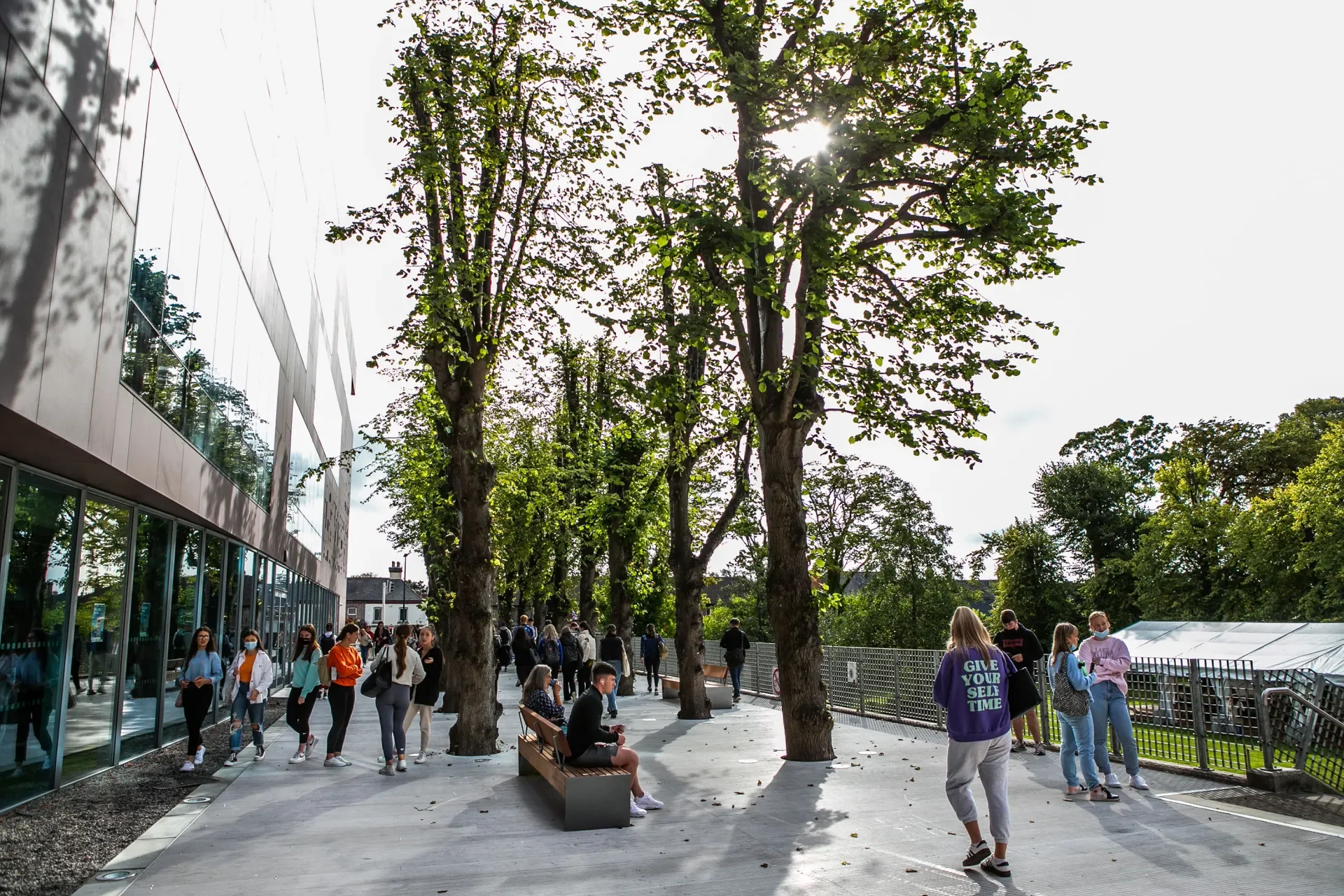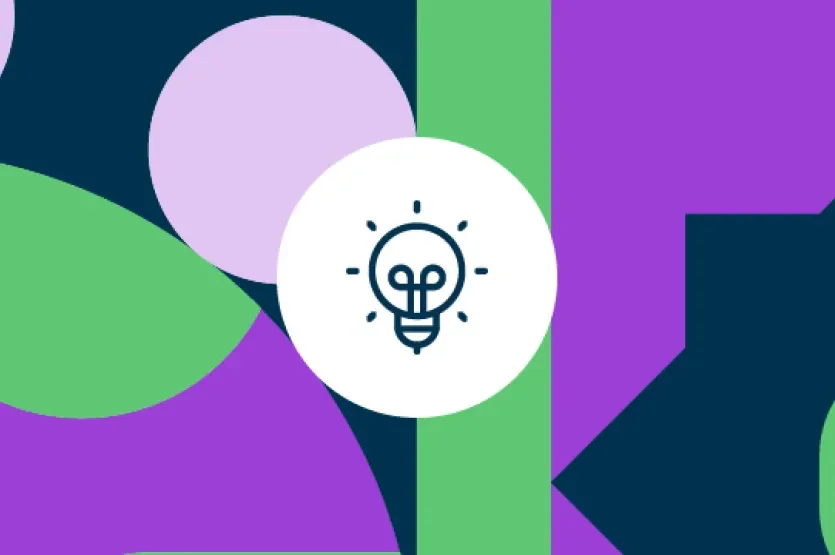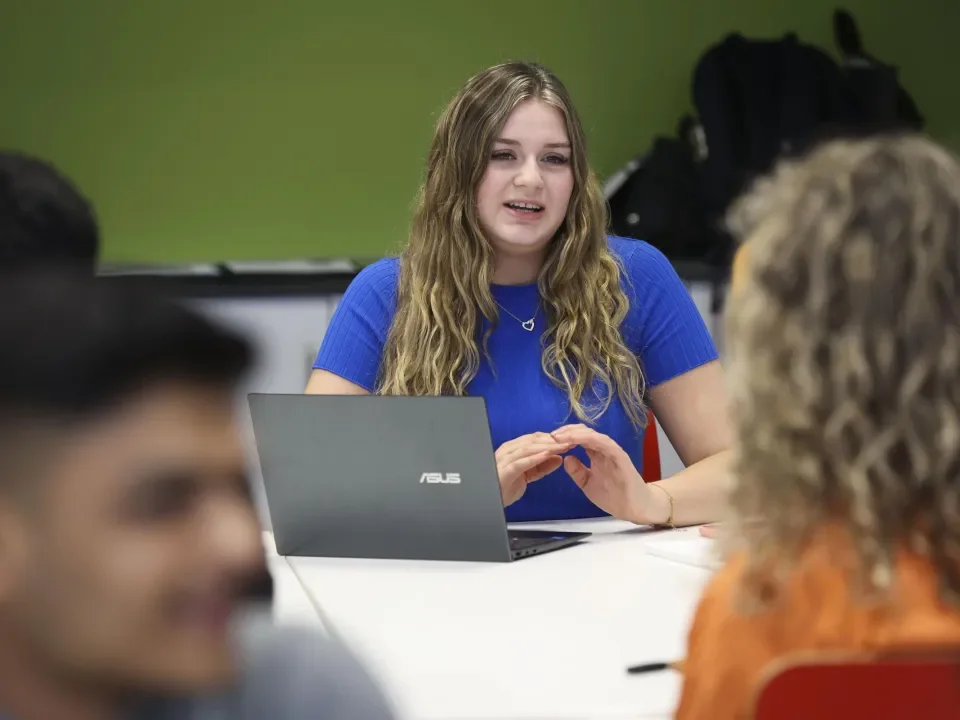Overview
During this two-year, part-time programme, you’ll learn more about the neurodiversity paradigm. You’ll also gain a better understanding of neurology and the autistic experience. Furthermore, you’ll study evidence-based approaches to inclusive education, and explore the strengths and characteristics of autistic pupils.
Benefit from practical and theoretical study
This flexible course is delivered in-person and online to facilitate working teachers. As well as core modules, you’ll complete two teaching practice visits to help you see what you’ve learned put into practice. You’ll also master relevant research methods and submit a dissertation on a topic of your choice.
Once you graduate, you’ll have the skills and knowledge to pursue special education teacher roles or lead inclusive education programmes for autistic pupils.
For more information, you can read this Department of Health report on ‘Estimating Prevalence of Autism Spectrum Disorders (ASD) in the Irish Population: A review of data sources and epidemiological studies (2018)
Why DCU
DCU People
Careers & Further Options
Careers
This programme will be of interest to educators seeking to hold special education teacher roles or to lead inclusive education provision for autistic pupils across whole school systems.
The number of students on the autism spectrum within the Irish education system increased 83% in the years between 2011 and 2018 (Cambell at al. 2017) and inclusive education provision to diverse groups of young people is the reality in an increasing number of mainstream schools.
This programme supports graduates to learn the skills to work effectively and lead within collaborative whole school settings, student-support teams, and work effectively with colleagues in fostering inclusive practice.
The programme will be of particular interest to:
- Teachers with a post-of-responsibility for special educational needs provision in schools at primary level, post primary level and in adult education settings
- Teachers working in special class settings for autistic pupils in mainstream schools
- Teachers working in special schools who work with autistic pupils
- Teachers who wish to further develop their expertise in the education of autistic pupils in relation to content knowledge and research-informed approaches to evidence informed teaching
Entry Requirements
The Master of Education in Autism (MEdA) programme is being offered as a two-year level 9 blended Master level programme open to teachers working in primary and post-primary schools, or in special schools or classes. Participants will be eligible to apply who hold a Level 8 qualification in education, at minimum H2.2 and be registered with the Teaching Council of Ireland (or its equivalent in other jurisdictions). Additionally, participants must also be working with pupils on the autism spectrum for the duration of their enrolment on the MEdA. Standard entry procedures for international applicants and for applicants with disabilities apply.
Applicants should meet the minimum entry criteria outlined above and will be interviewed to assess their application. Each interview will be scored according to a predetermined criterion, with places being offered to those with the highest scores.
Direct Entry into Year 2
Graduates of two DCU accredited postgraduate qualifications may be considered to enter the 2nd year of the MEdA. These are;
- The Graduate Certificate in the Education of Pupils on the Autism Spectrum (GCEAS), and
- The Graduate Diploma in Inclusive Education, Learning Support and Special Education (GDILS). Selection criteria may apply to all candidates.
Programme Structure
The Masters of Education in Autism is designed to meet the professional and personal needs of educators seeking to acquire deep expertise in the area of evidence informed education for autistic pupils. There is a particular focus on the translation of research evidence and theory into best practices in schools.
Graduates will develop the skills and knowledge to effectively collaborate with others and lead the development of a culture of inclusion for autistic pupils in primary, post-primary or special schools, and other recognised educational centres.
The role of evidence-informed practice in the classroom, innovative approaches to collaboration, and whole-school approaches to supporting inclusion will be emphasised in this programme. Learners will also master a range of relevant research methods and complete a level 9 dissertation.
You will take five core modules in first year, with classes delivered on campus and online. There will be two teaching practice visits to scaffold translation of programme content to professional practice. Second year will comprise three modules focusing on collaborative practice, whole-school inclusion and educational inquiry and thesis.
- To develop expertise in fostering and supporting whole-school inclusive practice for autistic pupils
- To develop a deep understanding regarding the strengths and profiles of autistic pupils
- To gain practical support and expert guidance in using assessment to inform accurate pupil profiles and facilitate individualised planning to support inclusive education
- To develop awareness regarding a range of evidence-informed pedagogical approaches shown to be appropriate for autistic pupils
- To develop the skills to lead and collaborate with colleagues, young people, and parents to foster inclusive school settings that meet the needs of an increasingly diverse pupil population
Fees and Funding
Fees
How To Apply
To apply for this programme:
- All Applicants must apply through DCU's Student Application Portal which is available here. Here's a quick step by step guide if you need help with your application.
All Applicants must submit
- Certified academic transcripts for each and every year of study
- Please upload a CV under the "Supplemental Items & Documents" section. The CV should highlight relevant work experience, including at least one year in area of Special and Inclusive Education.
- Personal statement of 500 words maximum indicating area of research interest
- Non Native English Speakers must submit evidence of competence in the English language as per DCU entry requirements see link http://www.dcu.ie/registry/english.shtml
Non-EU Applicants
Applicants who require a study visa for the purposes of gaining entry into Ireland are ineligible to apply for this programme.
DC972 will not be running for the 2025/26 academic year
Life On Campus
At DCU, our students can expect a unique campus experience. We are known for our excellent teaching and learning facilities, our active clubs and societies, and our great social and sporting facilities. All this makes DCU an exciting place to be.
DCU has three academic campuses; Glasnevin, St. Patrick’s and All Hallows (both in Drumcondra), all close to Dublin City centre.
They can be reached by public transport, Dublin Bus and Bus Éireann, with our Drumcondra campuses a ten minute walk from Drumcondra Train Station. Glasnevin is a 20 minute walk from St Patrick’s and All Hallows. They are also linked by Dublin Bus.
Each campus has a library (O’Reilly, Cregan and Woodlock Hall), study spaces, restaurants, and on-campus residencies. There are sports facilities on Glasnevin and St. Patrick’s, and there is a dedicated sports campus, St Claire’s, located near Glasnevin on the Ballymun Road.
DCU’s 19,000 students have access to exceptional teaching and learning facilities across our three academic campuses.
These include modern learning theatres, research centres, a new media and TV studio, radio/podcast studios, computer suites and advanced labs in the areas of Languages, Engineering, Physics, Chemistry and Biotechnology, as well as a Sports Performance centre and a training hospital ward. In 2021, we opened our first virtual reality ‘Leadership Lab’, which is located in our Business School.
We continue to improve and update our facilities. For example, construction of a new world-class STEM facility is underway on the Glasnevin campus. With capacity for an extra 3,000 STEM students, this facility will advance DCU’s international reputation for excellence in science and health, computing and engineering disciplines.
Studying in DCU isn’t just about course work. The university is rich in student life and activities.
There are more than 140 clubs and societies for students in DCU, with ‘Clubs & Socs’ days taking place on both the Glasnevin and Drumcondra campuses at the start of the academic year. They span everything from rugby to rock climbing, anime to jazz.
For many students, sport is an important part of the DCU experience. DCU’s Sports Complex boasts a 25 metre swimming pool, fitness centre gym, all-weather pitches and squash courts, as well as soccer, GAA and rugby pitches. DCU Dóchas Éireann, the university’s GAA club, is the largest third level Gaelic Games club in the country. Meanwhile, DCU Athletics has been Ireland’s highest achieving university club for many years. And DCU has dozens of other clubs to get involved in, from Archery to Weightlifting.
The Glasnevin campus is home to our purpose built, state-of-the-art student centre, The U, which serves the needs of a rapidly growing student body. Here, you will find the Student Leadership and Lifeskills Centre, performing arts and cultural spaces for students and the wider community, and the Entrepreneurship and Innovation Hub. Also located on our Glasnevin campus is The Helix, our renowned performing arts centre.
On our St Patrick’s campus, we have the Java Student Hub, a vibrant, warm and welcoming space where students can meet for coffee, play music, use the projector to watch events, or just relax. The walls of the Java Hub were designed based on the cultural history of St Patrick’s Campus, including the special references to the notable sporting history and history of the arts.
We have a number of academic, professional and social supports for students.
Student Advice & Learning Skills Centre - Offers a wide range of supports and services to students and advice
The Writing Centre - drop-in writing workshops for students through the academic year
Maths Learning Centre - provides maths support for students of all ability levels with maths modules
Student Learning - facilitate the transition from passive to active learning for students at DCU, by teaching study skills, nurturing critical thinking and building student confidence.
Careers work with students to help them on their professional journey into graduate employment.
Our student support team offers a comprehensive support programme, helping students make that all important transition into university life and focusing on building confidence and skills which are key to success at third level.

DCU St Patrick's Campus
FAQs
What courses are offered by the DCU Institute of Education?
DCU Institute of Education brings together students of education and provides a rich menu of undergraduate courses across all sectors from early childhood, to primary and post-primary and further and higher education. We offer a range of taught and research postgraduate courses at doctoral, masters, diploma and certificate level and have a distinguished record in providing continuing professional development.
Is there Garda vetting for students who study DCU Institute of Education courses?
Garda vetting is required for all students who have unsupervised access to children and vulnerable adults as part of their studies at DCU. Applicants must successfully pass the Garda vetting process in order to complete the registration process.
What are the potential teaching pathways for primary, post-primary and further education and training offered by DCU?
Primary Teaching Pathways
Undergraduate*
Postgraduate**
- Professional Master of Education (Primary Teaching) - DC970
* Please ensure that you consult minimum entry requirements and CAO points for all undergraduate programmes
** Please ensure that you consult minimum entry requirements for all postgraduate programmes
Post-Primary Teaching Pathways
Undergraduate*
- Bachelor of Religious Education & English or History or Music - DC010 | DC011 | DC012
- Bachelor of Education in Gaeilge and French or German or Spanish - DC013
- Bachelor of Education in Technology, Engineering and Graphics - DC015
- Bachelor of Science (Hons) in Science Education - DC203
- Bachelor of Science (Hons) in Physical Education with Biology - DC205
- Bachelor of Science in Physical Education with Mathematics - DC206
Postgraduate**
- Professional Master of Education (Post-Primary Teaching) - DC905
* Please ensure that you consult minimum entry requirements and CAO points for all undergraduate programmes
** Please ensure that you consult minimum entry requirements for all postgraduate programmes
Further Education and Training Teaching Pathways
Undergraduate*
- BSc (Hons) in Education and Training (Further, Adult and Continuing Education) - DC235
* Please ensure that you consult minimum entry requirements and CAO points for all undergraduate programmes









